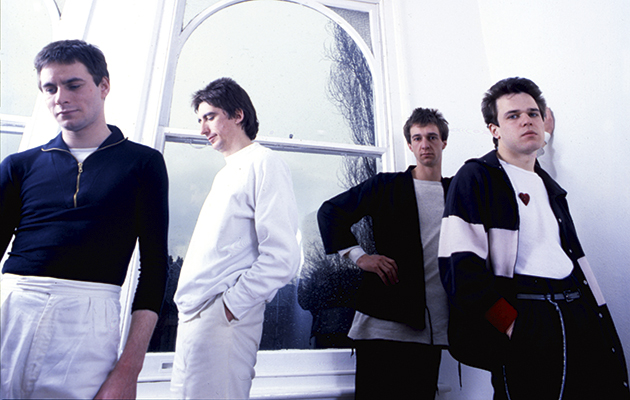CHAIRS MISSING
HARVEST, 1978
Perhaps their masterpiece, Wire’s second album was energetic but expansive, and probably the band’s favourite of their ’70s work.
NEWMAN: What marked Chairs Missing from Pink Flag was “Practice Makes Perfect”. It was the defining track, and everything else went forward from it. Compared to Pink Flag, it had a different rhythm, a much more angular, spiky sound. The beginning of recording was less promising, though – someone had the idea that we should prepare a piano, so we spent two days underneath a piano fiddling about and trying to record a song called “Underwater Experiences”. The reason why we couldn’t play it is that four bandmembers and a producer didn’t realise it was in 3/4. It was the blind leading the blind!
GREY: The prepared piano? Someone must have been listening to Steve Reich! It wasn’t me… Wire has always been about everybody putting their ideas in, to take things in different directions. We have to make it interesting for us.
LEWIS: For Pink Flag, I’d write texts, and Colin would demonstrate how he thought the song went, then everyone would arrange and find their parts. When we came to do Chairs Missing, things became a lot more two-guitar based, and Bruce and I had started writing more tunes. So it was a bigger mix between us – as on “Two People In A Room”, where all three of us are credited with writing it. The whole thing expanded. I think everybody felt more confident about the things they’d liked before punk – because punk was very puritanical. I think you can hear the interest we had in German music like Neu! and Can, or early Floyd. Later, when that whole goth thing started, the tone of Chairs Missing seemed to be quite influential. But without ghosts! Chairs Missing was more about transvestites than ghosts.
NEWMAN: I always had the impression the band felt this was their favourite ’70s record. It was still fresh, we were all still enthusiastic, and none of the various camps had formed in the band.
________________________
154
HARVEST, 1979
An epic as dark as the band’s mindset, 154 ranged from the flighty pop of “The 15th” to the apocalyptic maelstrom of the lengthy “A Touching Display”.
LEWIS: This seemed like a very logical, organic step forward for us. There’s a wider vision than on Chairs Missing, a darker vision. But it was a pretty dark time, so I think that’s fairly natural.
NEWMAN: This was a very strange record to make. I didn’t play on “A Touching Display”. Bruce didn’t play on “The 15th”, partly so it probably wouldn’t be a single. There’s always been politics in Wire. “The 15th” couldn’t be a single, because it was my tune and my lyric, and not everybody in the band played on it. It’s all excruciating stuff! 154 was a difficult record.
LEWIS: It was not such a happy time. There was a lot of frustration with the record company, money and managers. Not enough good advice, if you like.
NEWMAN: There was some discussion as to whether Brian Eno should work with Wire. I was always very much against it, as I think Eno is very good when you have a band with someone who is very dominant in it, when it’s useful to have somebody who’s very creative to stimulate the situation so new ideas come up. But if you have a band who all have strong opinions, like Wire, the last thing you need is someone coming in with even more ideas.
LEWIS: We worked damn hard for a very concentrated period, and we were all very ambitious and started to have lots of ideas [for other work]. Not that we knew that Wire was going to stop for as long as it did.



